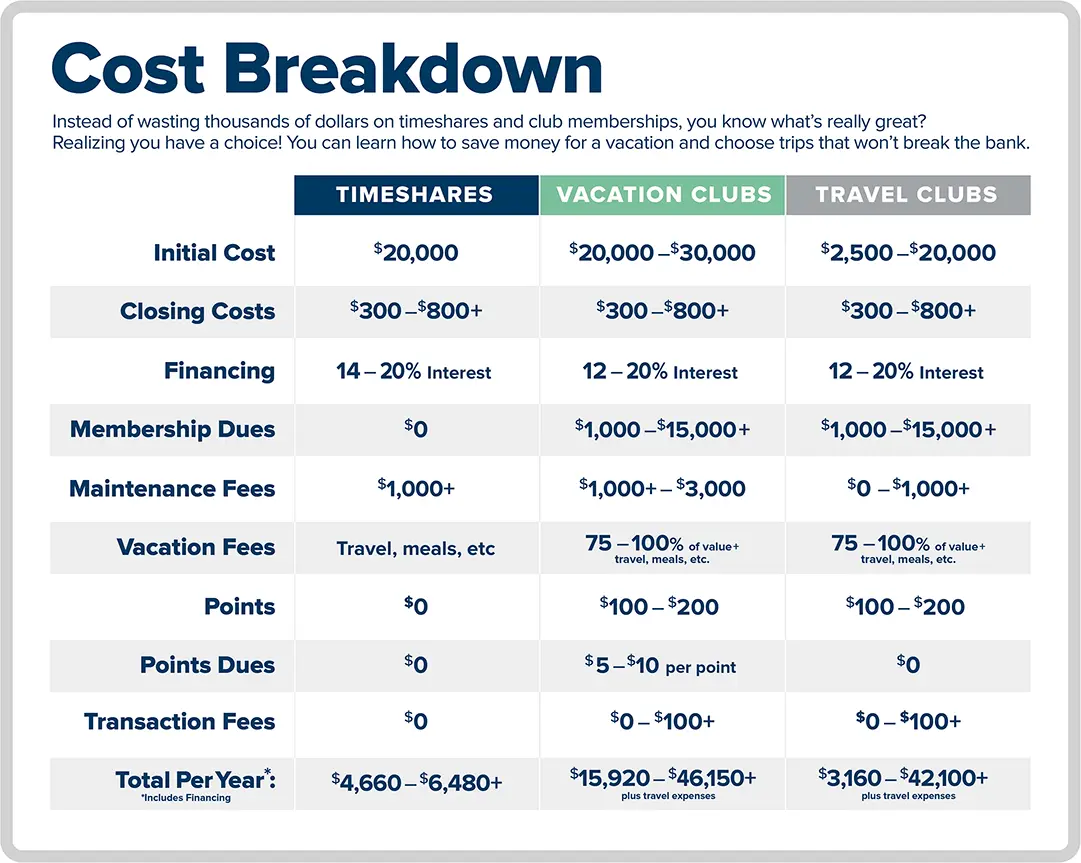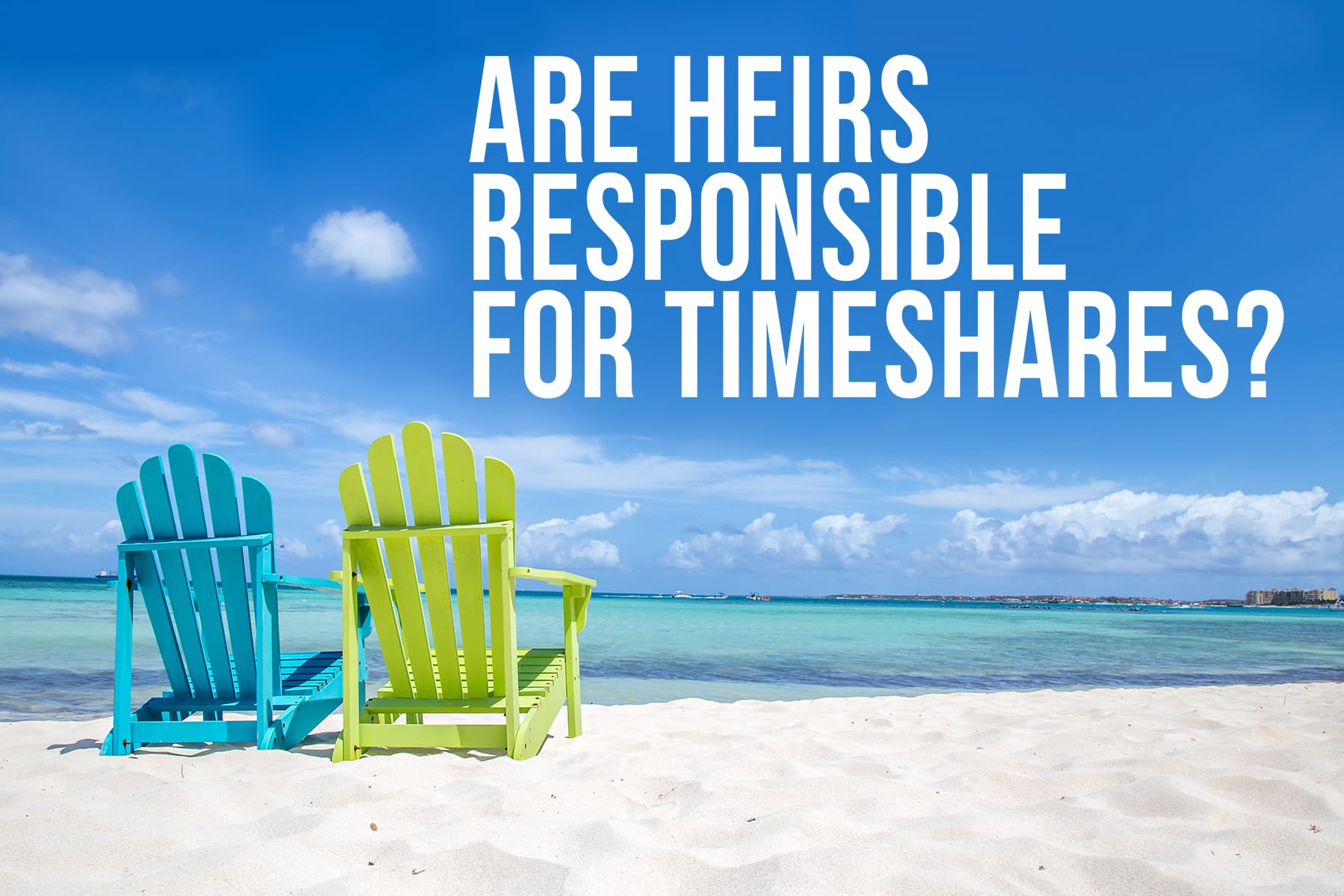Table of Contents
Timeshares vs Vacation Ownership and Travel Clubs
What are the critical differences between timeshare and vacation ownership? Vacation ownership is a broad term for selling more consumers on timeshare properties. It sounds more credible and perceives timeshares as a financial investment, even though investment opportunities are typically the last thing they provide. So, since vacation ownership is often another term for timeshares, sales teams also use it in their pitches. The word “ownership” seems to make clients feel more confident about the deal they’re on the fence about making.
Timeshares, aka vacation ownership, can offer access to unique destinations worldwide. Still, many vacationers have mixed emotions regarding this aspect due to not wanting to spend much time at a tourist-packed destination. That is especially true during certain seasons. While another plus is that you don’t have to perform maintenance work for timeshares, they include yearly maintenance fees at a continuously increasing price. Eventually, ownership over these fractional vacation properties can become a hefty financial obligation that is challenging to plan for as a property owner.
One of the reasons some sales teams refer to timeshare properties as vacation ownership is that it easily confuses them with vacation clubs. Doing so makes avid travelers and prospective owners feel like they’re making a sound investment instead of throwing their money down the drain.
FREE
Timeshare Exit Info Kit
Get your free Timeshare Exit Info Kit today to learn more about Wesley Financial Group and how we may be able to help you get out of your timeshare.
Timeshare Exit Info Kit
Get your free Timeshare Exit Info Kit today to learn more about Wesley Financial Group and how we have saved 50,000 families over $635 million in timeshare debt.
What Is a Timeshare?
A timeshare is a vacation ownership in which multiple parties hold undivided interests in a property.
A timeshare purchase, also called vacation ownership, entails a lifetime commitment to paying for yearly visits to the same resort or group of resorts. You finance or prepay a lump sum upfront and annual maintenance costs. If you want to stay somewhere other than where you originally paid, upgrade or exchange fees may be involved. The average trip lasts one week.
What Is Fractional Ownership?
Fractional ownership is a method in which several unrelated parties can share and mitigate the risk of ownership of a high-value tangible asset, usually a jet, yacht, or piece of resort real estate like traditional timeshares. You’re essentially sharing the time spent at your unit with other people who also get to use the same space at different times. Hence the name timeshare.
Fractional properties entail the following aspects:
- A right to use policy under timeshare law
- Reserved week(s) at your vacation home/resort property
- Increased yearly maintenance fees due to more time spent at your unit and generally higher-end features and amenities
- The possibility for exchange either internally or externally through a third-party exchange company
Two ways to own equity within fractional ownership are shared deeded or leased ownership.
Shared deeded ownership or “fee-simple” agreements give the buyer a share of ownership. Around 90 percent of timeshares are fee-simple or shared deeded ownership. Shared leased ownership – or right-to-use contracts – allows the buyer to use the property for a predefined period. That is different from shared deeded ownership in that you don’t own any portion of the property. Ownership reverts to the original owner at the end of your term.
Shared Deeded Ownership
A shared deeded timeshare gives each buyer partial equity in the physical property. For example, a timeshare unit sold in one-week increments can technically have 52 owners per unit. That’s to say: buying one week in this particular resort condominium unit would result in a one-fifty-second (1/52) ownership interest. These types of ownership are often held in perpetuity and willed to one’s estate upon passing.
Shared Leased Ownership
Shared leased ownership interest allows the owners the right to a specific vacation property for a fixed-week timeshare or floating-week timeshare each year. With shared leased ownership, the timeshare company still holds the deeded title to the property. A lease agreement will expire, and owners will retain ownership perpetually.
What Is a Vacation Club?
A vacation club is a membership-based vacation ownership program that allows members to vacation at various locations. Members buy points they then use later to purchase vacations at certain resorts worldwide that are a part of the club’s affiliation. However, there’s a catch. It can be hard to find availability if you want to spend a vacation at a popular time of the year. Vacation clubs can provide more options than traditional timeshares. The long list of destinations and the chance to book as many rooms as possible is a big plus for vacation club members with growing families.
Certain vacation clubs and their terms may allow members to save the points they don’t use for one year and roll them over to the next. However, this isn’t always the case; sometimes, it may come as a fee. Like timeshare properties, vacation clubs can come with a long list of expenses like annual dues, management fees, and other facility fees. These fees are also not set in stone and are prone to increase yearly. That is why some members feel that vacation clubs slowly take more and more money from them. While vacation club membership looks appealing initially, the feeling fades away quickly.
What Is a Travel Club?
A travel club is a membership-based program that provides members access to various travel-related services and discounts.
The Difference Between Timeshares, Vacation Clubs, and Travel Clubs
Timeshares and vacation clubs are often confused, but some key differences exist. Timeshares typically involve the purchase of a specific unit of property. In contrast, vacation clubs usually involve the purchase of points that can be used to book vacations at a variety of locations. Timeshares and vacation clubs can be expensive, and there are often maintenance fees associated with ownership. Travel clubs may or may not involve the purchase of points, but they always provide members with access to discounts and other travel-related services.
Though similar in many ways, a travel club usually provides members with more of an all-around experience. For example, in most travel clubs, it is customary for members to receive accommodations such as discounted airfare, car rental, and access to a particular hotel operator.
On the other hand, vacation club membership usually involves an exclusive focus on resort experiences. The management company does not cover your travel or way of getting there. Much like travel clubs, membership in vacation clubs differs depending on the parent company. However, if you’re more into someone doing the entirety of planning for your vacation, a membership to a travel club is probably one of the better ownership options.
What Is a Timeshare Exchange Company
Timeshare Exchange Companies are the reason timeshares are the most accommodating type of vacation ownership in the world. Timeshare owners can exchange their time at their “home resort” for a time at one of the numerous affiliated resorts included in a given exchange network by using timeshare exchange companies.
It begins when the owners deposit their fixed week and/or floating week of the year they own for a different week or location of equal value. A point system calculates the value of the timeshare weeks and their worth in terms of other resorts and vacation periods. As a result, it creates a catastrophe of owners seeking more points solely because the timeshare industry told them they had to get the best next vacation.
After the exchange companies find an equivalent match, owners can make the swap. The catch is that this all comes at a steep price. Exchange companies usually charge a hefty fee for travelers to sign up for their program. Though specific properties may make it seem like they have the best deals available, you’re only losing more money in the long run. However, some owners are fortunate enough that the resort developer will cover these costs for their first year.
The Costs of Each Option
These limitations add a high emotional cost to your trip. Before you even consider the dollar amount, that is.
Clubs play up their “discounts” and then slap members with fees and upgrades totaling thousands of dollars. Knowing these upfront and buried costs will help you understand why travel and vacation clubs are poor investments.
The First Purchase
Memberships in some budget travel clubs cost about $5,000. This sounds good, but the average American vacation only costs approximately $2,037.1, which is significantly less.
On top of that, most clubs charge more. A membership typically costs between $20,000 and $40,000. You could expect to pay between $100,000 and $1 million for a luxury membership.
Compared to vacation clubs, travel clubs typically have lower upfront costs ($2,500–$40,000). However, that still does not imply that they are inexpensive. Second, while you might receive lower prices, your private vacation is forfeited.
To receive discounts, keep in mind that you are traveling with other club members.
Closing Costs
Closing costs will be involved if you purchase any of these financial catastrophes, just like when buying a home. Closing costs for both clubs and timeshares typically range from $300 to $500, occasionally even more.
Financing Options
Companies that sell timeshares and clubs provide financing for customers who cannot fully make the initial payment. Additionally, the interest rates on these loans are astronomical.
Take the case of a $40,000 vacation club membership. Since you don’t have the total amount, you put 10% down and finance the remaining 90% for ten years at $260 per month. That doesn’t sound too bad until you consider the 12% interest you’re paying!
Your final cost for that $40,000 membership will be $31,000. $11,000 more! And none of the other fees have been paid.
Membership Fees
Membership dues are typically not one of the many fees associated with timeshares, however. Vacation and travel clubs are worse in this regard!
You still have to pay an annual membership fee even if you already purchased a “lifetime” club membership (30-year, five-year, or whatever). This might cost between $1,000 and $15,000.
What Are Maintenance Fees?
The resort management company will send you an invoice for additional expenses, known as yearly maintenance fees. The property developer or management group will collect these annual fees to cover various resources for maintenance, such as upkeep, service, and preservation around the property. The worst part? These fees tend to increase year after year.
Rising costs are the exact problem that many timeshare owners are currently facing. Having signed up for a timeshare thinking the maintenance fee was a flat rate every year until year two or three came along, the cost has increased exponentially for inadequate maintenance services. Experts in the travel industry say it’s cheaper just to rent a hotel room for two weeks every year rather than own a timeshare and pay these yearly maintenance fees.
Vacation Fees
With a timeshare, you’ve already paid for your accommodations for your trip, but that’s it. You’ll still have to pay for transportation, lodging, and entertainment when you get there. There are undoubtedly less expensive ways to travel than a timeshare once you take those costs and the annual maintenance fees into account.
Clubs are a step down from that. The vacation has a price tag; it’s discounted, not free. You pay the club dues, a portion of the resort’s price, and additional costs like travel, lodging, meals, and souvenir T-shirts.
Travel clubs occasionally promise their members “free” trips. Even if the “free” trip includes lodging, some meals, and some entertainment, it won’t cover all of your costs.
Which Option Offers the Best Value for Money?
While they do exist, moral vacation ownership and timeshare companies are hard to spot. It’s stressed that any owner interested in fractional ownership properties must do extensive research. Many timeshare vacation ownership programs hurt owners rather than help them. For instance, many owners are given a list of so-called benefits during a high-pressure sales pitch before they sign up. It isn’t until a few months later, or when owners use the unit, that they realize these benefits are nowhere to be found and/or offered.
Cost Breakdown of Timeshare, Vacation Club, and Travel Clubs

How Do I Cancel My Timeshare?
Owners everywhere begin to look for ways out of their timeshare agreements once they realize how much money they’re throwing away. Units can cost owners thousands of dollars; the worst part is that most rarely take advantage of their vacation properties. So how can they exit their timeshares and never have to think of them again?
Some owners attempt to put up their timeshare for sale. The problem with this is the timeshare resale market is a tough niche to break into. When most consumers go through a timeshare purchase, it’s usually not with a previous buyer. Most of the time, it’s with a timeshare resort or club that has found a way to get them in for a sales presentation on their timeshare programs. Not many vacationers buy from previous owners, so putting your timeshare up for sale is challenging in the vacation industry.
One of the worst ways an owner can attempt to exit their timeshare is to stop paying for it. Most owners don’t realize that timeshare clubs and resorts are treated like real estate. If you stop making payments, the management company will make collection efforts on you, potentially ending in foreclosure. That only hurts you more in the long run.
The most effective solution to getting rid of your timeshare is to find a legitimate timeshare cancellation team to help terminate your timeshare agreement. This way, you can seek third-party assistance rather than just trying to take on the cancellation yourself. The staff you sign up with will be able to help communicate with resorts and their properties to allow you to exit whichever program you were left stranded in. Looking for a cancellation team that offers industry experience and a 100% money-back guarantee is essential. In this course of action, you receive all your money back if they do not cancel your timeshare within an agreed-upon period.
Summary
Timeshare ownership can be very misleading. Staff members of timeshare resorts love to connect emotionally with their potential clients, but it’s not always an honest relationship. Amid their sales pitch, the difference between owning a timeshare and vacation ownership often gets blurred.
If you’re trying to enter the timeshare resale market, you must remember just how hard of a time you might have due to limited buyers. Putting your unit up for sale can take years to finalize, and its initial quality standards will only suffer. Your best option for terminating your agreement with a resort is to find a cancellation team with excellent customer service. Paying money for a cancellation service isn’t fun, but continuously paying for vacation time you never get to use is much worse.

Over 50,000 families helped!
Find out if you can cancel your timeshare. Schedule a FREE consultation with timeshare cancellation experts now.
Get Rid of Your Timeshare
Schedule a FREE Consultation with one of our timeshare cancellation experts who have saved families over $635 million.










